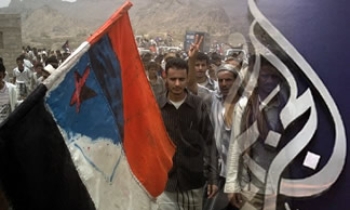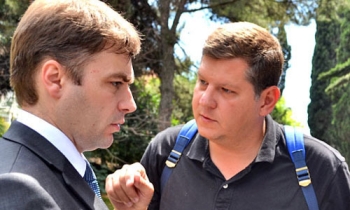Iraq has recommended that US authorities release six of the eight Iraqi women in military custody, but has denied that it was part of a bid to free a kidnapped American journalist, according to Al-Jazeera. The kidnappers of Jill Carroll have threatened to kill her unless all Iraqi women detainees are freed by Friday, January 20.

(Christian Science Monitor/Delphine Minoui)
The US military did not confirm the releases would take place, but earlier on Wednesday had said eight Iraqi women were in military detention. An Iraqi government commission reviewing cases of Iraqi detainees recommended to US authorities on Monday that six of the women be released.
Carroll, 28, a freelance journalist working for the Christian Science Monitor, was kidnapped in Baghdad on January 7. Her kidnappers, a group calling itself the Revenge Brigades, have threatened to kill her unless the United States freed all female prisoners in Iraq within a 72-hour deadline, which expires on Friday.
An official from the Iraqi Human Rights Ministry, which sits on the commission, said on Thursday the call to free the women was not made in response to demands from Carroll's kidnappers. "There was no outside pressure on the commission" to release the women, said the official who declined to be identified further because he feared reprisal from fighters, the Al-Jazeera report said.
Al-Jazeera aired on Thursday new images of Jill Carroll surrounded by gunmen, according to a Reuters report. The silent images appeared to be from the same video tape issued by a group calling itself the Revenge Brigades and which Al-Jazeera aired earlier this week. They showed Carroll sitting on the floor of a bare room, surrounded by three armed and masked men. One man appeared to be reading from a statement.
As the deadline set by Carroll's abductors near, reports of appeals for her release have been pouring in.
Jill Carroll's mother appealed Thursday for her daughter's release after her captors threatened to kill her if US authorities did not release all Iraqi women in military custody. Mary Beth Carroll told CNN that video images gave her hope that her daughter is alive but also have "shaken us about her fate."

"I, her father and her sister are appealing directly to her captors to release this young woman who has worked so hard to show the sufferings of Iraqis to the world," she said. "Taking vengance on my innocent daughter who loves Iraq and its people will not create justice."
Mary Beth Carrol said that her daughter was aware of the risks of reporting in Iraq and that she was mindful of her security. Carrol said they talked about what would happen if Jill were kidnapped. "I think that I'm in shock right now, and I know that falling apart is not going to help my daughter. And I can say her father and her sister are the same way. And I think when this is resolved we'll all fall apart."
The International Federation of Journalists (IFJ), immediately after Carroll's abduction, said Iraq and its major cities had become a "deathtrap for journalism" and said its affiliates and others journalists' groups in the country would vigorously support efforts to find her. "With more than 100 media deaths, hostage-taking on a regular basis and targeting of reporters, Baghdad has become a deathtrap for journalism," said Aidan White, IFJ General Secretary. "No journalist is safe once they take to the streets."
The IFJ says that western journalists are particularly in danger and says media organisations must warn correspondents, particularly freelance reporters, against taking any unnecessary risks. The IFJ called on the Iraqi Journalists' Syndicate and other press groups to use their networks to try to get information on the whereabouts of Jill Carroll. "The taking of hostages is a sinister and brutal reminder of the anxiety-filled reality of daily life for media people," said White. "We must do everything we can to make sure Carroll is released quickly and safely."
According to Reporters sans Frontières (RSF), 55 journalists and 22 media assistants have been killed in Iraq since the start of the war in March 2003. Of the 77 victims, 56 were Iraqi and four American. Carroll is the 35th media worker to be kidnapped since the start of the war. Five of the kidnap victims (four Iraqis and one Italian) were killed by their abductors. The others were all released safe and sound. Twenty-three of these kidnappings have taken place in or near Baghdad.

RSF said in a statement, "We appeal to the press of the entire world, especially in the Arab countries, to speak out in support of Carroll. The media must not limit themselves to reporting the news, they must themselves call for Carroll's release. Muslim organisations in the United States must also intervene. Their help is valuable. Real solidarity with Carroll must be urgently demonstrated. People must act as quickly as possible and with the same energy as with previous hostages. Carroll's US nationality must not be allowed to hold back the show of support."
"Jill Carroll is an independent journalist who has reported with deep sympathy and courage on the situation confronting all Iraqi citizens. It was her great desire to understand all sides of the conflict that led her to the Adil neighborhood where she was kidnapped," Committee to Protct Journalists (CPJ) Executive Director Ann Cooper said. "We call on those holding Jill Carroll to recognise her status as a neutral observer by releasing her immediately and without harm."
An American Muslim delegation is in Jordan seeking the release of Carroll, an IslamOnline report said. "We're taking a serious step on behalf of our community, and we are hopeful that our words will be heard and our appeal will be listened to," Nihad Awad, the executive director of the Council on American-Islamic Relations (CAIR), was quoted as saying by the Associated Press.
Muslim leaders have condemned the abduction of Carroll. "Kidnapping is un-Islamic," Adnan Al-Dulaimi, a senior Iraqi Sunni leader, told the Christian Science Monitor Thursday. "We reject this act. It is absolutely condemned. We will do as much as possible to release Jill," he said over phone from Kuwait, where he was attending the funeral of Kuwait's emir Sheikh Jaber al-Ahmed al-Sabah.

According to IslamOnline, the Association of Muslim Scholars, Iraq's highest Sunni religious authority, also pressed for Carroll's release. "All kidnappings and assassinations are completely rejected... especially when kidnapping a journalist," AMS spokesman Muthana Harith al-Dari said. "Journalists are in Iraq to tell the world about the occupation so kidnapping a journalist is going to hide the truth."
Egypt's Muslim Brotherhood also issued a similar call. "We call upon the brothers in the Iraqi resistance not to target media workers," the group, which controls a fifth of seats in the Egyptian parliament, said in a statement. "This contradicts the principles of our religion and doesn't help the cause of liberating the country".
On Tuesday, Ayman Al-Safadi, editor of the Jordanian daily Al-Ghad, expressed anger and dismay that Carroll would be targeted by armed groups. "She put her life at risk by struggling to convey the voices of Iraqis to American public opinion, which was showered with wrong information about the developments in Iraq."









